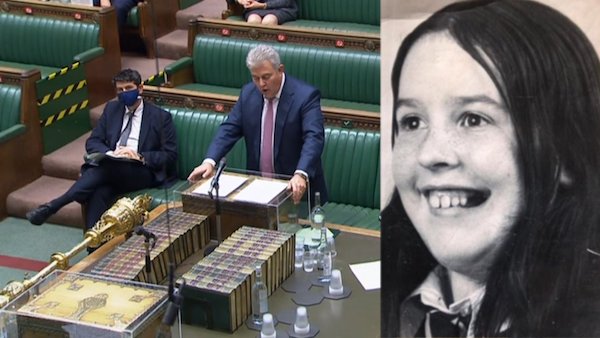
British Direct Ruler Brandon Lewis has today announced a unilateral statute of limitations in the Westminster parliament to end all conflict-related prosecutions, including all killings perpetrated by the British Crown forces and loyalist death squads.
It is also set to include all killings perpetrated by republican armed groups, although the precise details of the blanket amnesty remain unclear. Lewis confirmed only that the Tory statute of limitations would “apply equally to all Troubles-related incidents”.
He told the House of Commons (pictured, left): “We know that the prospect of the end of criminal prosecutions will be difficult for some to accept”.
He said there would be an “information retrieval and provision process”, but only where families “do not want the past raked over again”.
“It is in reality a painful recognition of the very reality of where we are,” he said.
It was recently announced that prosecutions taken against two British soldiers for the murder of nationalist civilians in Bloody Sunday and Operation Motorman, both in 1972, were to be abandoned. Both decisions are facing a legal challenge.
However, the British amnesty legislation to be introduced by the end of November would kill off any prospect of justice in either case.
Simon Coveney, Dublin’s foreign affairs minister, insisted the proposals were not “a fait accompli”.
He tweeted that the 26 County government had a “very different view” and claimed Lewis was “committed to an inclusive dialogue to try to agree consensus and that’s under way”.
But Britain’s Direct Ruler in the Six Counties was clear today that he considers conflict-related prosecutions in the north of Ireland to be at an end.
Lewis said “an independent new body” would have “powers to seek access to information”. He also said there would be “a major oral history initiative” which would “create opportunities for people from all backgrounds to share their experiences and perspectives”.
The announcement confirms Britain has reneged on the 2014 Stormont House Agreement, which was itself intended to resolve peace process issues arising from Britain’s refusal to honour previous agreements.
Sinn Féin’s John Finucane, son of British assassination victim Pat Finucane, tweeted:
“Today the British government made it clear that victims don’t matter to them. They have cruelly decided to cover up their conflict role in Ireland forever.
“As always, Britain’s interests come before everything else. They care nothing for victims or for truth and justice.”
Michael O’Hare, whose 12-year-old sister Majella (right) was shot by a soldier in 1976, said the legacy proposals set out by Brandon Lewis were an “utter and unacceptable betrayal”.
Mr O’Hare, supported by Amnesty, is calling for an independent investigation into the killing.
He said: “These proposals are an utter and unacceptable betrayal – they must not succeed. The UK Government is inflicting great pain on my family and other victims denied justice.
“Our Majella had her life cruelly robbed, at the tender age of 12, by bullets from a soldier’s machine gun. She was an innocent child with her whole life ahead of her. The Ministry of Defence apologised to my family, but a proper investigation has never happened.
“The UK Government is now trying to deny us meaningful truth and justice forever. I will never stop fighting for Majella – my sister deserves justice. I hope these proposals are firmly rejected. I call on all parties involved to end the perpetual cycle of victims being failed.”
John Teggart, spokesman for the families of ten people killed in the Ballymurphy massacre in west Belfast in 1971 said that “once again legacy families are being traumatised over fears that the UK government is planning to introduce an amnesty for crimes/murders that happened during our recent past”.
“We see this as the British Government’s cynical attempt to bring in an amnesty and a plan to bury its war crimes,” he said.
Referring to the outcome of the inquest into the Ballymurphy killings, Mr Teggart said, “The Ballymurphy Massacre inquest findings in May this year is the perfect example of why there should not be a statue of limitations.
“Justice Keegan confirmed what the Ballymurphy Massacre families always stated that all those who lost their lives in the Ballymurphy Massacre were ‘entirely innocent of any wrongdoing’ and ‘posed no threat’.
“This is a war crime and those responsible must be held to account.”
Earlier, the British Prime Minister Boris Johnson described prosecutions of former British soldiers for murder was “vexatious”.
“We are finally bringing forward a solution to this problem, to enable the people of Northern Ireland to draw a line under the Troubles and to enable the people of Northern Ireland to move forward.”
![[Irish Republican News]](https://republican-news.org/graphics/title_gifs/rn.gif)
![[Irish Republican News]](https://republican-news.org/graphics/title_gifs/harp.gif)

